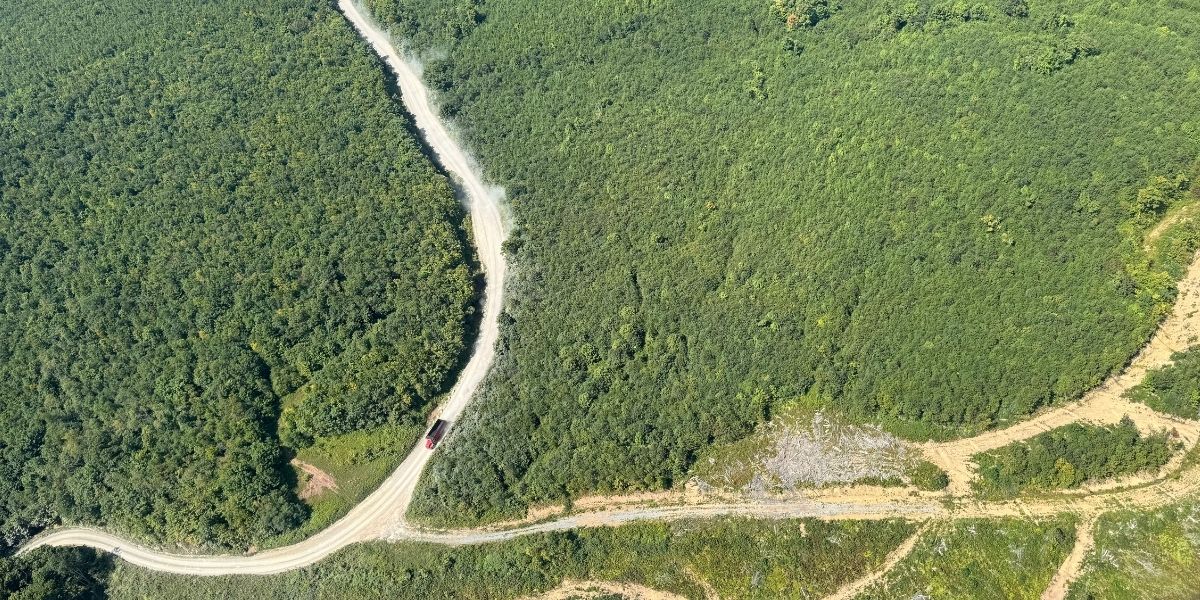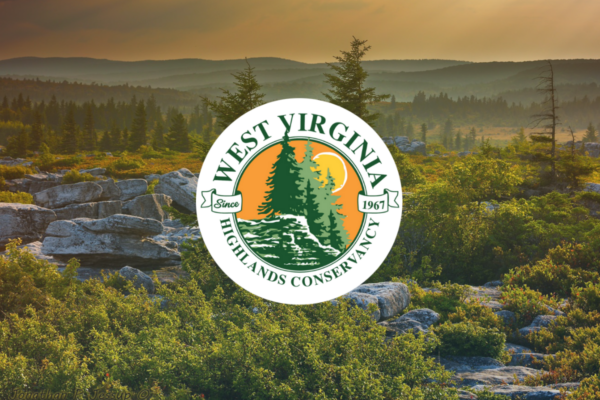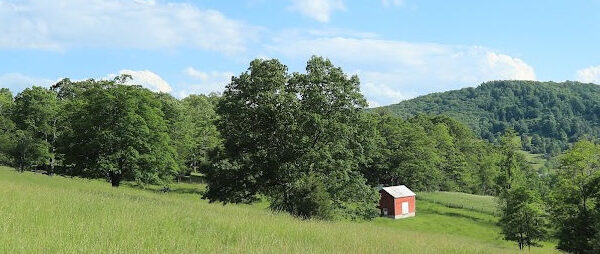Coal trucks travel along Haulroad #2 in the Monongahela National Forest. (Photo courtesy Allegheny-Blue Ridge Alliance Air Force)
By Olivia Miller, West Virginia Highlands Conservancy
While writing this story, we learned of a new development: on February 7, South Fork Coal Company filed for Chapter 11 bankruptcy. We’re still gathering information as to how the bankruptcy may impact environmental compliance, reclamation, or obligations to workers at this time. Below is our account of the haul road shutdown and the swift reversal that followed—written just before news of the bankruptcy broke. This situation is evolving rapidly, and we will provide updates as they become available.
In a whirlwind of conflicting decisions, the U.S. Department of the Interior has quietly allowed South Fork Coal Company to resume hauling coal through the Monongahela National Forest in West Virginia—just weeks after Biden administration regulators shut down the unlawful haul road.
Haulroad #2, snaking 1.2 miles through the steep and sacred Monongahela National Forest, is the only transport route linking the company’s 1,200-acre Rocky Run Surface Mine to its Clearco coal processing facility. The closure of Haulroad #2 would safeguard some of our most cherished public lands and critical habitats for native species like the brook trout from the impacts of South Fork Coal’s operations.
On January 13, the Office of Surface Mining Reclamation and Enforcement issued a cessation order to South Fork Coal Company, barring it from using Haulroad #2 to transport coal until it could prove valid legal rights to operate on national forest land—a requirement of federal law. The order followed complaints filed throughout the summer of 2024 by a coalition of conservation organizations, including the West Virginia Highlands Conservancy, Allegheny-Blue Ridge Alliance, and Appalachian Voices, and a letter signed by 11 grassroots organizations asking Sharon Buccino, who headed the OSMRE under President Biden, to take decisive enforcement action.
Though Buccino’s OSMRE did the right thing, justice was short-lived. Unbeknownst to the groups that spurred the enforcement action, South Fork Coal Company swiftly appealed the cessation order to an administrative appeals board. Then, on or around January 27–after the keys to federal agencies had been handed over to the incoming Trump administration–the DOI’s Office of Hearings and Appeals granted the company’s request to reopen the road without informing the public or the very organizations that had brought the violations to light.
“This reversal is a textbook example of regulatory capture,” said Andrew Young, staff attorney for the Allegheny-Blue Ridge Alliance. “The agency itself admitted that this road should not be used for unlawful coal hauling across the national forest. We compelled OSMRE to act—and then, behind closed doors, they apparently caved to industry pressure. We won’t let this stand.”
Conservation groups only learned about the closure on January 31, and about the hearing on February 3—long after the process was underway and a temporary stay of the cessation order was granted.
“Reopening the road behind closed doors raises serious concerns and is a stark reminder that ‘King Coal’ still wields its power in the shadows,” said Young. “By overruling its own enforcement agency, DOI raises pressing questions about industry influence and whether the agency is prepared to ignore federal law when the coal companies come calling.”
“Why were the parties who demanded enforcement action in the first place locked out of this process? Why wasn’t the public informed,” Young added. “And why did the agency solicitor appear to stand aside as South Fork Coal Company argued for a green light to flout the law?”
For years, South Fork Coal Company has piled up environmental violations, yet regulatory agencies have repeatedly failed to enforce the law. In addition to operating an unlawfully permitted coal haul road in the national forest, South Fork’s mines have caused scores of violations of the Clean Water Act in recent years, as detailed in a lawsuit filed by conservation groups in December 2024. We are also challenging the U.S. Forest Service’s issuance of a commercial road-use permit to South Fork Coal Company because the agency failed to complete the required NEPA analysis or Endangered Species Act consultation before authorizing industrial scale coal hauling through the forest. The company’s operations also lack required protection and enhancement plans for the endangered candy darter, in violation of the Endangered Species Act–violations that are implicated in yet another lawsuit filed by Appalachian Voices and the Center for Biological Diversity against the OSMRE.
South Fork Coal Company currently operates on more than 4,000 acres at the headwaters of the Cherry River—a major tributary of the Gauley River and a world-class recreation destination. Their strip mines lie just six miles from the Cranberry Glades Wilderness Area, West Virginia’s largest Wilderness, and two miles from the Falls of Hills Creek Scenic Area.
“South Fork Coal is a known bad actor,” said Willie Dodson, coal impacts program manager for Appalachian Voices. “According to the company’s own data, its mines have polluted the Cherry River upstream of the drinking water intake for the town of Richwood. The company has run roughshod over numerous regulations to the detriment of the Cherry River, the Gauley further downstream, and the Monongahela. These are the precise natural resources that the local economy depends on now, and that local communities will continue to depend on long after South Fork Coal is done and gone. This unlawfully permitted haul road is just one among many shortcuts taken by South Fork Coal Company, yet instead of enforcing the law, the Department of the Interior is letting them off the hook.”
We are deeply disappointed, though admittedly not surprised. West Virginians have a proud legacy of standing up to outside profiteers who exploit our mountains and communities. Yet the power to defend these cherished places ultimately rests with an informed, energized public—people who refuse to be silenced by King Coal. While we press our case in the courts and with regulators, this fight demands a nationwide wave of support to protect our public lands. Whether by raising your voice in your hometown or sharing the facts that empower others, your involvement is essential. Our mountains, people, and future hang in the balance.
We forced one shutdown of the haul road, proving that our advocacy works. There’s no guaranteed path ahead, but with your help, we can and will push for a permanent closure. If federal agencies fail to uphold the laws they are sworn to enforce, secret deals and corporate influence will continue to chip away at important public lands protections. This struggle reaches well beyond West Virginia, reminding us that when one national forest is at risk, all are threatened. Join us—help safeguard the Monongahela National Forest, and together, we can protect America’s natural heritage for generations to come.





Comment(1)
Jake says:
February 15, 2025 at 8:19 pmTo anyone out there, remember when you were a kid playing in the creek? I guess we assumed our elders wouldn’t do anything so foolish as to ruin it.
Everyone in America supports
“continuing on” with our destructions while other countries are 100% self- sustainable concerning energy. If we had any rationale we’d recognize independence lies in being intelligent. We’re an inferior country now, and in the shadow of an almighty God who has an apparent desire to destroy the creation.. we continue supporting this monster and the people feeding it by electing them into positions of power.
On a simpler note to all the outdoors-men, what do you suppose you’ll be eating from a polluted stream if there’s no fish in it? You can choose life or no life. Food is a necessity, pollution is not. If you or your children had to survive, obviously we’re making that harder by being fools.
Imagine for a moment this land prior to laws and Europe’s conquering ideals. You could drink water ANYWHERE! You could hunt forever and walk without fear of a fence while on horseback. Even the men who logged this land in WV, cutting massive timbers in a place we can now only tell stories about that your kids and mine have no chance at experiencing. THAT… is injustice.